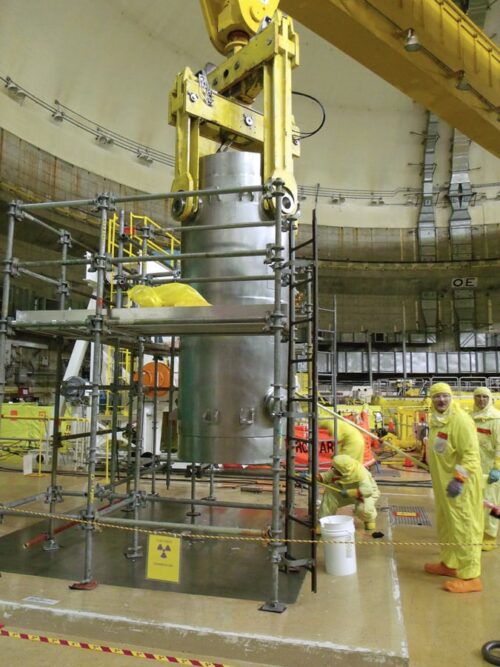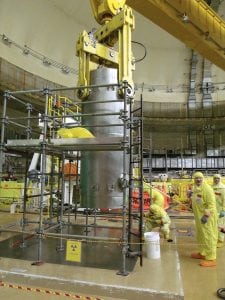
Home » Local nuclear industry services firm completes $2 million contract
Local nuclear industry services firm completes $2 million contract

August 16, 2016
For almost 20 years, Babcock Services Inc. (BSI) has served clients in the nuclear industry. Although the company is headquartered in Kennewick, employees live throughout the country and travel to job sites at various nuclear facilities as needed.
This year, however, Babcock Services landed a contract with a nuclear power plant just minutes away from its home base.
“We’d been waiting for the Energy Northwest Columbia Generating Station contract to come out for a few years,” said Phil Gallagher, senior vice president of Babcock Services. “We’ve been doing this work at dozens of other commercial nuclear plants in the U.S., and we bid every opportunity where we can provide the service and be competitive. It was just nice to go after one that came up in our own backyard.
 “This is the first fuel pool cleanup contract (Energy Northwest has) put out in the last five years and it probably won’t happen again for another five.”
“This is the first fuel pool cleanup contract (Energy Northwest has) put out in the last five years and it probably won’t happen again for another five.”
The $2 million contract was for the compaction of radiologically-activated control rod blades and fuel channels. Compacting the waste allows for it to be disposed in a safer and more economical manner.
“We take material that has outlived its usefulness. It’s activated, not dangerously, but it’s been subjected to radiation for so long that it becomes activated,” Gallagher said. “Our equipment compacts the material so it can be placed in the containers much tighter. The end result is something that took up 10 times more space before compacted. And in the nuclear world, you dispose based on volume. When you reduce it 90 percent in volume, you’re going to have 90 percent less waste disposal cost.”
BSI used a machine called the Activated Services Compactor, which it designed in 2007.
“BSI has built relationships in the industry, and an individual had some great ideas for compacting but didn’t have the ability to implement them. We said, ‘Let’s see if we can make a go of this.’ It started with a whiteboard session and we pursued it. We were pretty confident we could capture some of the market because the existing technologies were not working,” said Gallagher, who added that the brainchild behind the design, Kent Forrester, is now part of the BSI team.
The compactor was built by local fabrication company, Monarch Machine and Tool Co. in Pasco and has been through several generations of modifications as BSI continues to improve the original design. Gallagher said work involving the machine accounts for about 30 percent of BSI’s revenue.
“It’s been recognized in the industry as being valuable,” he said. “One of our clients has won an award for reducing their volume of waste. … It’s a win for them, and it’s a win for the public because it’s less waste.”
According to Gallagher, Energy Northwest contacted BSI—which is classified as a small business—as well as two larger companies that provide similar work in the nuclear industry. The companies were asked to submit bid proposals for the 2016 contract.
BSI’s bid was accepted and five months later, after Energy Northwest’s maintenance outage, BSI got to work.
“Babcock was determined to be the best qualified and fair-priced bidder among the three bidders. Their new equipment technology, the Activated Services Compactor, was a primary factor in the bid evaluation process,” said Jay Taylor, Energy Northwest contracting officer.
Along with a team from BSI, Gallagher said they utilized other small local businesses to complete the project. Meier Architecture•Engineering of Kennewick performed the structural and seismic calculations as a subcontractor, and Monarch Machine and Tool Co Inc. built all of the equipment.
“We mobilize equipment—bring in our compactor and power unit—and stage them on the refueling floor. Everything gets placed into the fuel pool using a crane. We bring the control rod blades through the equipment, process them through, and compact them down. Then we load the control rod blades into the liner and the liner gets lifted into a cask. The cask gets shipped out to the U.S. Ecology site where it remains. We filled five casks,” said Gallagher, explaining that the work started in February and ended in May. “Energy Northwest was a great client to work for.”
BSI has tried to tap into the international nuclear market, but Gallagher explained the cost of shipping equipment makes it difficult to be competitive.
“But we are tracking the opportunities, and I believe we’ll have some success internationally eventually,” he said.
Gallagher said they have plenty of opportunities on the horizon. Along with work involving the compactor, BSI handles work at Hanford for the environmental remediation project.
“You don’t want to rely on one skill set or client too much,” he said with a laugh.
In the future, BSI hopes to work on the decommissioning and demolition of reactors, which sometimes involves decontaminating as well. Gallagher said there’s a half-dozen reactors set to be shut down over the next few years, so the goal for BSI is to use its technology to help clients save money decommissioning and tearing down those plants.
And with the successful completion of the Energy Northwest contract on its resumé, BSI is likely to attract more work.
“They performed the work skillfully and without error,” Taylor said.
Local News Environment
KEYWORDS august 2016





